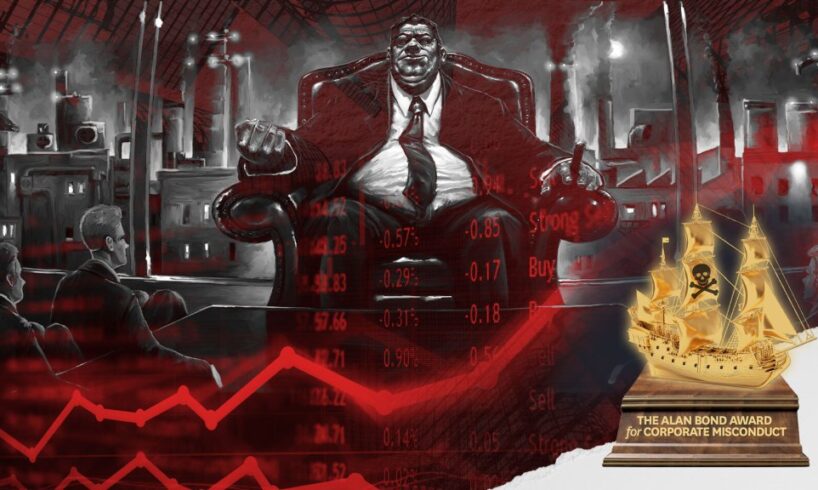
There’s a common characteristic running through Australia’s worst companies, be they local or foreign or what sector they’re in: they’re oligopolists. Our worst company is the dominant member of a cosy duopoly in aviation. Google, one of the most anti-competitive companies on the planet, is a top-five performer. Fossil fuel giants dominate the upper reaches of the list. The casino duopoly and a member of the free-TV oligopoly are in the top ten as well.
This is the Australian disease: a medium-sized economy on a giant landmass with a population too small to support strong competition in its key markets, with decades of weak competition laws that have allowed big companies to get bigger — to build up their market concentration, their ability to impose mark-ups on consumers and other businesses, and to increase their political influence to manipulate public policy in their own interests. With few exceptions, governments have sat back and allowed the disease to flourish, incentivising the manipulation of policy with a two-speed democratic system in which access to policymakers can be purchased by those with enough money to attend political fundraisers.
The lack of competition leads to sloppy management and dud boards: executives and directors who don’t care about their company repeatedly breaching the law, or ripping off customers or enabling organised crime, or who see those as the mere costs of doing business, with PR-spun media lines about improving internal processes always ready to go. They see competition as an unhealthy threat to be neutered, governments to be manipulated, and losses and costs to be eternally shifted to other parties — most particularly the public. All in the name of delivering for shareholders.
Who are those shareholders? Look in the mirror. Usually, apart from private equity-controlled companies, it’s us.
Related Article Block Placeholder
Article ID: 1223942
Pretty much every working Australian and most retired Australians are beneficiaries via their superannuation accounts. The result is a circular economy in which we pay too much for poor-quality goods and services, and endure the harms created by corporations, only to benefit at the back end from higher shareholder returns, even if we have to wait decades for the benefit. That cancelled flight, that fee charged on a dead relative, that flood caused by the climate crisis, those higher prices charged by oligopolies, those taxes avoided and evaded (with the advice of a consulting firm), the costs of problem gambling — we pay the costs as consumers and taxpayers, and get the benefits as shareholders through a superannuation system that locks us all into Australian and global capitalism, for better and for worse.
Independent. Irreverent. In your inbox
Get the headlines they don’t want you to read. Sign up to Crikey’s free newsletters for fearless reporting, sharp analysis, and a touch of chaos
By continuing, you agree to our Terms & Conditions and Privacy Policy.
That’s the regulatory dilemma: governments that crack down on anti-competitive markets or regulate industries to perform better would curb the flow of profits back to shareholders, the tax returns they enjoy (the big four banks delivered $10 billion in tax revenue in 2023-24) and the ability of big super funds to deliver on expectations of double-digit growth for us all each year. Want better banks? Want a decent airline? Want fossil fuels taxed and shut down? The costs will show up down the line in your super statement.
The immediate winners from this form of circular capitalism are boomers, the first cohort in our Keating-era superannuation/retirement system. But subsequent generations will also benefit, eventually — younger Australians will have to wait until the second half of the century to enjoy those precious superannuation returns, but those oligopoly profits will steadily accumulate until then, aided by compound interest.
So, like it or not, we really are all in it for the money: moaning about Qantas, abusing banks and big retailers, lamenting the climate crisis — perhaps it’s a form of theatre to occupy us for our working lives while we wait for retirement (or semi-retirement, as most of us will eventually prefer) to deliver us all the benefits — tax-free.
The losers are those of us with only limited super funds, and anyone who genuinely cares about productivity. The national self-flagellation about poor productivity performance has faded for the moment in the wake of the government’s roundtable, but one of the primary drivers of that performance, market concentration, remains unaddressed. We’re all invested in a system that creates a perverse incentive for lazy oligopolists, bludging polluters and predatory corporations.
Have you shifted your super away from certain companies?
We want to hear from you. Write to us at letters@crikey.com.au to be published in Crikey. Please include your full name. We reserve the right to edit for length and clarity.





